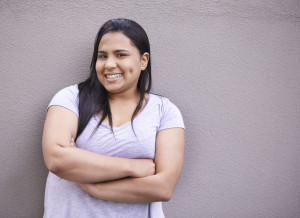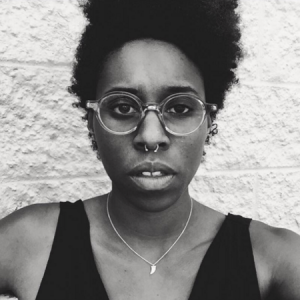Originally published on Ravishly and republished here with their permission.
I see a life coach.
The funny thing is, I call her my life coach when I’m doing well. I call her my therapist when I’m doing not-so-well. Because really, she’s one in the same.
According to her – and the firm for which she works – the difference between a therapist and a life coach is just that: where you are in life. If we were looking at a scale that goes from -10 to 10, a therapist would be there for you if you were on the negative side of zero, helping you to reach a healthier, more neutral place. If you’re already there, though, a life coach helps you improve that position, moving you up the scale into more happiness and life satisfaction.
A therapist, essentially, helps you learn to survive. A life coach teaches you to thrive.
And the more that I think about the mainstream body positivity movement – and all of the issues therein – the more I think it could benefit from adopting this model.
Which is why I’ve started using “body acceptance” to describe the work that I do and the values that I stand for, rather than “body positivity” – because I think it’s time that we, as a movement, stop pushing people to love their bodies completely before they’ve even had a chance to apologize and make friends with them.
Because while “Love Your Body” mantras and “Everyone Is Beautiful” Band-Aids are wielded by people with their hearts in the right places, it puts a lot of undue pressure on folks when we provide a “what” without the “how,” to expect them to miraculously jump from hatred to unconditional love in a single bound.
We’ve got to help people survive before we can expect them to thrive.
And while I’m all for a world where people of all shapes, sizes, genders, races, and abilities flaunt their stuff on the street, absolutely dripping with self-confidence, I also think it’s an unfair expectation.
Which is why, instead, I’m a proponent for body neutrality – for the acceptance of our bodies as-are, for the understanding that we are already enough, for the freedom to go about our days without a strong focus (positive or negative) on our physical shells – either as a step toward body positivity or as a goal in and of itself.
I think we need body positivity, especially as a radical expression of the right to life, liberty, and the pursuit of happiness in fat bodies. I also think we need an in-between stage for the folks who look at body love and feel daunted by the seemingly insurmountable task. Like, on this climb, where’s base camp?
And I think it’s here. At body neutrality.
Body neutrality is waking up in the morning and asking yourself, first thing, simply, “How do I feel in my body?” It’s figuring out what you need to feel good, whether that be pancakes or oatmeal for breakfast, water to rid yourself of a dull headache, or simply rolling over for more sleep.
Body neutrality is picking your outfit of the day based on simple concepts, like comfort, appropriateness, and expression. It means not feeling pressured either to wear what’s most quote-unquote “flattering” or to feel like a bodacious babe who’s out to make a statement.
Body neutrality is checking yourself in the mirror before you leave the house just to make sure there aren’t any stray hairs sticking out of your ‘do or wrinkles creasing your skirt. It’s neither to scrutinize your body nor to admire yourself. (And speaking of mirrors, body neutrality is also not feeling compelled to glance at your reflection in every store window as you pass by – I know I’m not the only one who does this!)
Body neutrality is stopping by the gym because it’s the dead of winter and that’s the only way to get your body moving, and you crave the feeling of blood pumping more freely through your veins. It isn’t about guilting yourself into a personal trainer to look “better” or about obsessively Facebooking about how much you “love” to sweat (I’ll never understand the “I <3 Sweat” camp) or Instagramming your progress in yoga for the world to see.
Body neutrality is not thinking twice about that craving you have for a grande mocha coconut Frappuccino (with whipped cream, please) because it is neither a source of shame (“If I get it, I’ll do a non-fat, no-whip tall”) nor pride (“Let me post this on Tumblr so everyone knows how not worried about food I am!”). It’s simply satisfying a craving.
Body neutrality is meeting a friend for dinner and, upon their telling you that you look great, assuming they mean your aura, your glow – not necessarily your physical appearance. It’s going to the Cheesecake Factory and perusing their “Skinnylicious” (ugh, I hate that name) menu just because you want more options to choose from. It’s ordering s’mores cheesecake because it strikes you as sounding amazing. It’s only eating half of it because that’s when you get full. It’s taking it home for later, in case you need a midnight snack.
Body neutrality is having hot sex with your partner and never overthinking the way that your ass smacks against their thighs. It’s not being embarrassed that you have fat on your body that is affected both by gravity and inertia, nor necessarily feeling sexier because you have fat on your body that is affected both by gravity and inertia. It’s enjoying that moment of intimacy, being comfortable in your body.
Body neutrality is falling asleep thinking about anything – anything – other than your body and what you’ll change tomorrow in the hopes of it altering eventually.
Body neutrality is freedom from the obsession with our bodies entirely.
Body neutrality is a blank slate.
Body neutrality is a starting point.
Body neutrality is a foundation.
Body neutrality is the place from which we can work toward building body positivity.
It’s where we can start to imagine a life where we fall asleep loving the skin that we’re in, feel extra hot when our bodies bounce during sex, order two slices of cheesecake because what the hell (and then post about it online because we’re pumped that we’ve freed ourselves from food shame and want others to see the light), get personal trainers to help us reach goals based on skill (rather than on weight loss), look in every reflective surface as we strut down the street to admire our thighs, wear what flaunts our favorites parts of ourselves, and wake up the next morning still loving the skin that we’re in.
Body neutrality is body acceptance, a stop on the train to body love. You can get off here or stay on for the ride toward the final destination. The point is, once you’re here, you’ll never look back and long for the place that you left.
And maybe if we propose this to people – if we give them the option to inch toward body love, rather than implying that the only way there is a catapult – they’ll (more comfortably, daringly, courageously!) feel empowered to leave their body hate behind.
[do_widget id=’text-101′]
Melissa A. Fabello, Co-Managing Editor of Everyday Feminism, is a body acceptance activist and sexuality scholar living in Philadelphia. She enjoys rainy days, tattoos, yin yoga, and Jurassic Park. She holds a B.S. in English Education from Boston University and an M.Ed. in Human Sexuality from Widener University. She is currently working on her PhD. She can be reached on Twitter @fyeahmfabello.
Search our 3000+ articles!
Read our articles about:
Our online racial justice training
Used by hundreds of universities, non-profits, and businesses.
Click to learn more





















